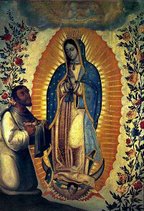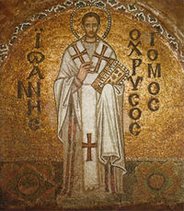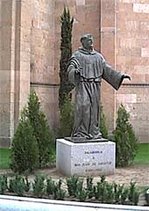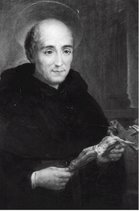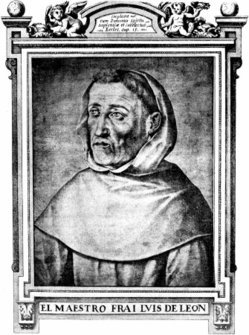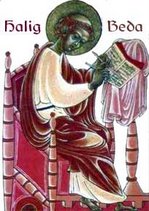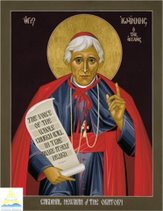
This is a satire I wrote around the drafting of the European Constitution and the rejection of all references to Christianity. Here is the Spanish original followed by an English translation.
Fray Luis desde la cátedra
Decíamos ayer . . . .
Cosas bonitas y sublimes que se prohibían
Y hoy igual que ayer las volvemos a repetir.
Fue apenas ayer, me acuerdo que decíamos . . .
Esto y aquello mas sin temor
Y con saña secreta vinieron y nos callaron.
Ahora mismo lo decimos en voz alta,
Mañana y pasado igual.
No se trata de poder y prestigio,
Estimados señores, no se trata de eso en absoluto
Sino de algo más profundo,
De verdades, se trata, de simples verdades
Y si por eso nos critican, y nos zahieren
Muy bien,
No por eso dejarán de ser verdades mañana o pasado.
No hay manera de evitarlo.
Así que adelante , insignes señores,
Adelante con sus mañas silenciosas,
Adelante con todo bozal y censura.
Pues a la postre se oyerá pese a todo prognóstico
Y se grabará en la memoria de las gentes,
Quizá en el inconsciente pero ahí quedará
Para brotar con mansedumbre
Cuando menos se espere, acaso alguna noche de San Juan
Bajo las estrellas, estas palabras volverán a dar su fruto
Pero ésta no será ninguna victoria rencorosa
Sino de paciencia y firmeza de espíritu
Y ojalá aquel día sus afanes y los nuestros sean los mismos . . .
Lo decíamos ayer, lo decimos hoy, lo diremos siempre:
A. ésta no es una pipa.
B. Jesucristo murió y resucitó pero no para redimir la humanidad sino más bien quitarse de en medio de treinta años y pico de impuestos romanos. Acuérdate que fue Judas el que se encargaba de la pasta.
C. Europa y Occidente tienen su historia,
una historia que no se entiende sin el cristianismo.
D. Pascual es la leche.
Translation:
Fray Luis from the lectern
As we were saying yesterday . . .
Beautiful and sublime things that were prohibited
And today the same as yesterday we repeat them once more.
It was just yesterday I remember we said . . .
This thing and that but without fear
And with secret rage they came and silenced us.
Right now we say it aloud
The same as tomorrow and the day after.
It is not about power and prestige
Dear sirs, it is not about that at all,
But something much deeper.
It is about truths, simple truths,
And if they criticize and wound us for that
So be it.
Not for that will these things stop being true today or tomorrow
It is unavoidable.
Go ahead, illustrious sirs,
With your silence machinations
With all muzzle and censorhip
For in the end it will be heard
Despite all predictions
And it will be recorded in people’s memory
Maybe only in the subconscious
But there it will remain to spring forth quietly
When you least expect it.
Perhaps some St. John’s eve
Beneath the stars
These words will once again give fruit
But this won’t be some resentful victory
But fraught with patience and firmness of spirit.
And let us hope that on that day
Your cares and ours will be the same . . .
As we said yesterday, we say today, and we’ll say it tomorrow:
A. This is not a pipe.
B. Jesus Christ died and resurrected but not to redeem humanity but rather to avoid thirty or so years of Roman back taxes. Remember that Judas was in charge of finances.
C. Europe and the West have their own history, a history which cannot be understood without Christianity.
D. Pascual brand Milk is the shiznit.










